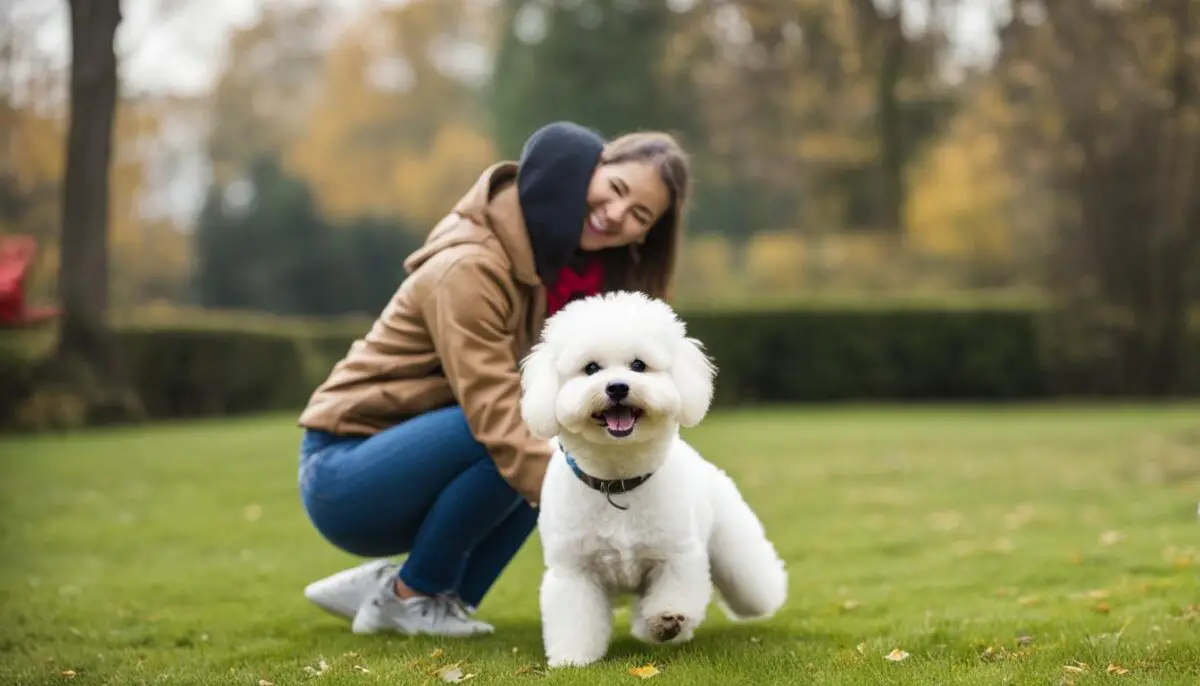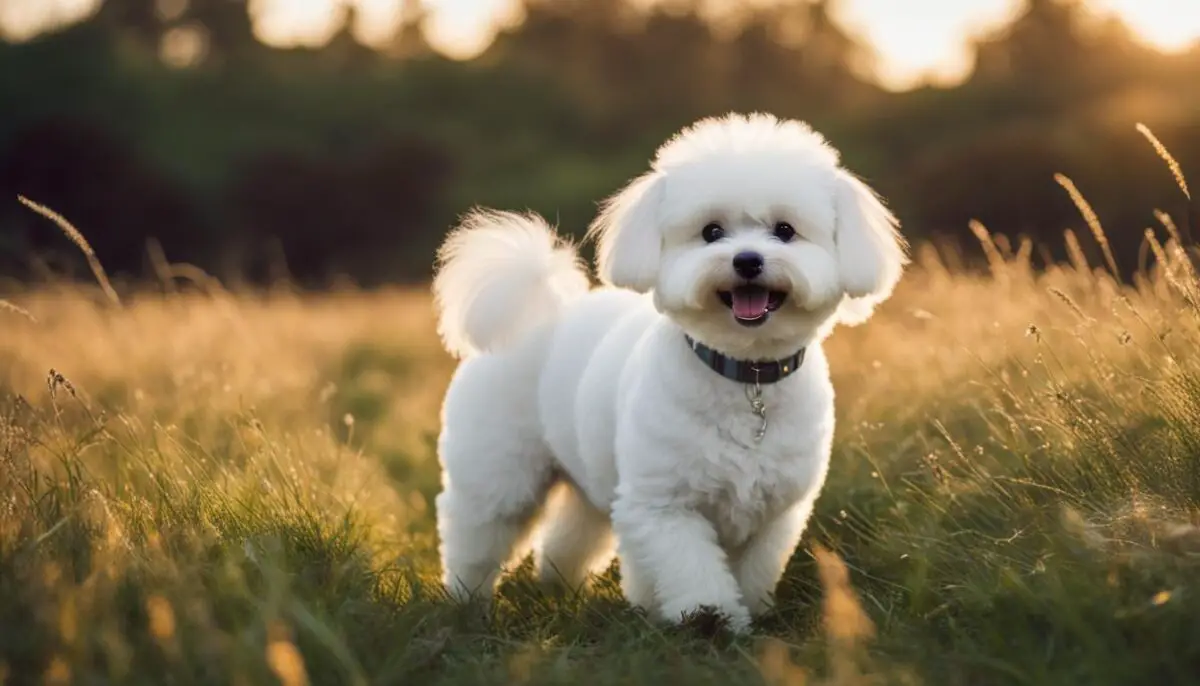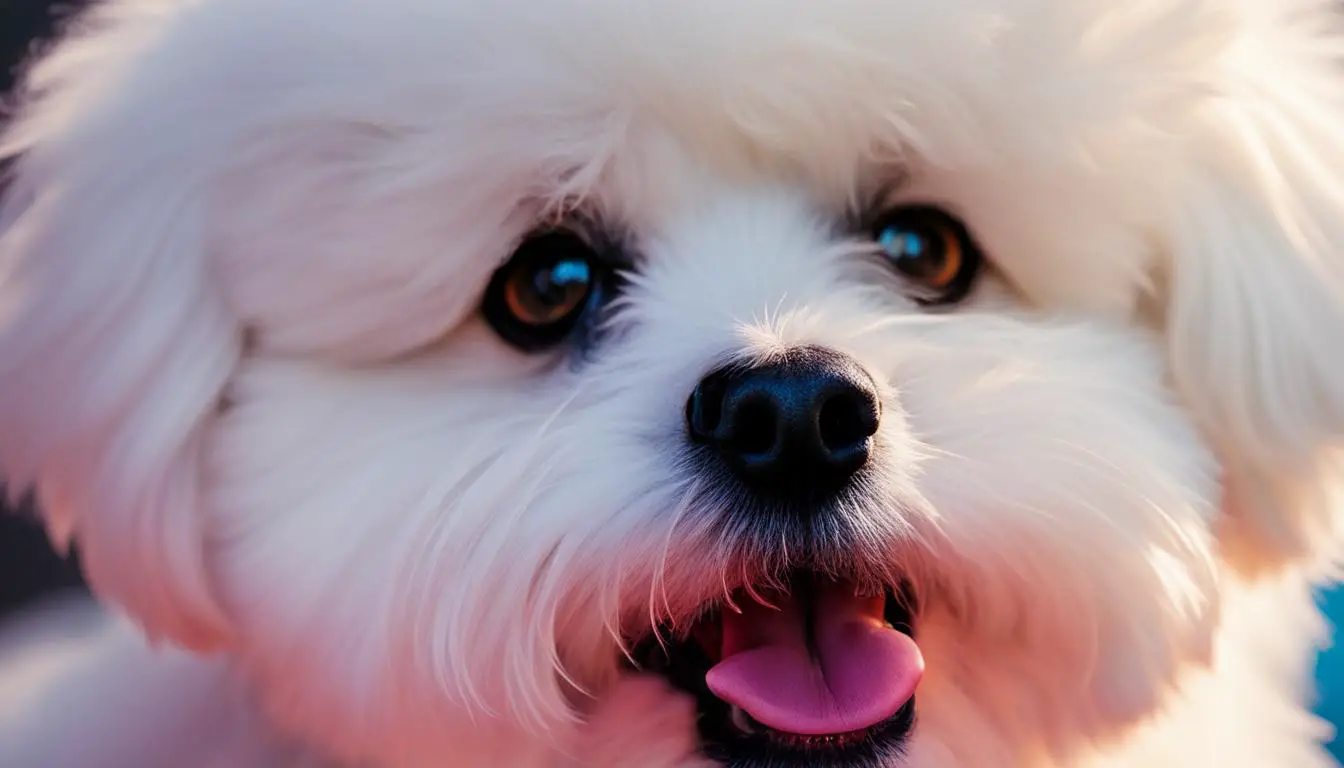The Bichon Frise is a delightful breed known for its attentive nature, loving disposition, and energetic personality. Originating from the Mediterranean islands, these small dogs have won the hearts of many with their sweet nature and affectionate behavior. However, it’s important to understand their temperament and behavior traits, especially when it comes to their interactions with children and other dogs.
Key Takeaways:
- Bichon Frises are generally friendly and affectionate dogs.
- They may not be suitable for households with young children due to their small size and potential for snapping.
- Proper socialization and training are essential to prevent aggressive behavior.
- They have a medium activity level and are well-suited for apartment living.
- Regular grooming and dental care are necessary to maintain their health and prevent skin conditions.
Are Bichon Frise snappy?
Bichon Frise Temperament Traits
The Bichon Frise breed is known for its entertaining and quirky personality traits. They are alert, curious, and always on the go, making them great performers and entertainers. Bichon Frises have a friendly temperament and are generally good with children. However, due to their small size, it’s important to supervise interactions between Bichon Frises and young children to prevent accidental injuries.bichon frise temperament
Bichon Frises also have a friendly temperament towards other dogs and can get along well with them. Their sociable nature and willingness to engage with other dogs make them a popular choice for families with multiple pets or those who frequent dog parks. It’s important to introduce Bichon Frises to new dogs slowly and in a controlled environment to ensure a positive and harmonious interaction.bichon frise behavior
Bichon Frise Temperament with Children
“Bichon Frises are generally good with children and can form strong bonds with them. However, because of their small size, they should always be supervised when interacting with young children to prevent accidental injuries. Teaching children how to properly handle and interact with a Bichon Frise is essential for maintaining a safe and harmonious relationship between the dog and child.” – Bichon Frise Expert
Bichon Frise Temperament with Other Dogs
“Bichon Frises have a friendly and sociable temperament towards other dogs. They are generally good at getting along with different breeds and sizes. When introducing a Bichon Frise to new dogs, it’s important to do so gradually and in a controlled environment to ensure a positive and successful interaction. Regular socialization and training can help foster good relationships between Bichon Frises and other dogs.” – Canine Behavior Specialist
Understanding the temperament traits of a Bichon Frise is crucial for potential owners and families. While these dogs are loving and affectionate, it’s important to provide proper supervision and socialization to ensure a harmonious relationship with both children and other dogs. By understanding and embracing their quirky and entertaining personality traits, Bichon Frises can bring joy and companionship to their families. bichon frise biting
Bichon Frise Behavior
Bichon Frises are generally not aggressive dogs, but like all dogs, they may bite if they feel threatened or scared. It’s important to socialize and train them from a young age to prevent any aggressive behavior. Additionally, their small size makes them prone to biting incidents if they are mishandled or provoked.
When it comes to aggression, Bichon Frises are usually friendly and sociable, but they may exhibit signs of fear aggression if they feel cornered or intimidated. Early socialization with other dogs and exposure to various environments can help prevent aggressive tendencies. bichon frise aggression
It’s essential for owners to understand the signs of aggression in Bichon Frises, such as growling, showing teeth, or snapping. If these behaviors occur, it’s important to consult with a professional dog trainer or behaviorist to address the underlying causes and implement appropriate training techniques.bichon frise personality
Table: Bichon Frise Behavior Comparison with Other Breeds
| Bichon Frise | Golden Retriever | German Shepherd | |
|---|---|---|---|
| Aggression Level | Low | Low | Medium |
| Biting Tendency | Low | Low | Medium |
| Size | Small | Large | Large |
| Socialization Requirement | High | High | Medium |
Bichon Frises are generally well-behaved and make great companions. However, it’s important to provide them with consistent training and socialization to prevent any behavioral issues. With proper care and attention, these adorable dogs can thrive in a loving and nurturing environment.
Bichon Frise Personality
Bichon Frises are beloved for their friendly and affectionate personality. They thrive on human companionship and are known to be great family dogs. Whether snuggling on the couch or playing in the yard, they enjoy spending quality time with their owners. Their loving nature and desire to please make them ideal companions for those seeking a loyal and attentive pet.bichon frise temperament traits
One of the standout traits of the Bichon Frise is their sociability. They generally get along well with people of all ages, including children. However, due to their small size, it is important to supervise interactions between Bichon Frises and very young children to prevent accidental injuries. With proper socialization and training, they can become excellent playmates for older children.
While Bichon Frises are known for their friendly nature, it is also important to note that they may develop separation anxiety if left alone for extended periods. They form strong bonds with their owners and thrive on constant companionship. It’s important to provide them with regular attention, mental stimulation, and daily exercise to keep them happy and prevent any destructive behaviors that may arise from anxiety. bichon frise temperament with children
The Bichon Frise’s loving and sociable personality makes them a wonderful addition to any home that can provide them with the love and attention they crave. Their adaptable nature also makes them suitable for various living situations, including apartments or homes with small yards. With their charming personality and loyalty, the Bichon Frise is sure to bring joy and companionship to any household.

Bichon Frise’s Suitability for Apartment Living
The Bichon Frise is a breed that is well-suited for apartment living due to their temperament and behavior traits. These dogs are known for their adaptability and low exercise needs, making them an ideal choice for those living in smaller spaces.bichon frise temperament with other dogs.
Despite their small size, Bichon Frises have a moderate activity level and can get their exercise needs met with regular walks and visits to nearby dog parks. This ensures that they can burn off energy and stay mentally stimulated, even in an apartment setting.
Additionally, Bichon Frises are generally not known for excessive barking, which is an important consideration when living in close proximity to neighbors. Their friendly and sociable nature also makes them well-suited for apartment living, as they can easily adapt to new environments and interact positively with other residents.
To summarize, Bichon Frises are a great choice for apartment dwellers who are looking for a small, low-maintenance, and friendly companion. With their adaptability and moderate exercise needs, they can thrive in apartment settings as long as they receive regular exercise and attention.
Comparison between Bichon Frise temperament and behavior in different living environments:
| Apartment Living | House with a Yard | |
|---|---|---|
| Exercise Needs | Low | Moderate |
| Space Requirements | Adaptable to smaller spaces | Requires a larger yard |
| Barking Tendencies | Generally not excessive | May bark more frequently |
| Interaction with Neighbors | Friendly and sociable | May require more supervision |
In comparison, Bichon Frises living in houses with yards may have higher exercise needs and may bark more often due to the larger space and potential triggers in the environment. It’s important to consider these factors when determining the best living situation for a Bichon Frise.
Bichon Frise’s Trainability
The Bichon Frise breed is known for its high intelligence and quick learning ability, which makes them highly trainable companions. With the right approach and consistent positive reinforcement, Bichon Frises can excel in obedience and trick training. Their intelligence and eagerness to please their owners contribute to their trainability.
It is important to use positive reinforcement techniques such as treats, praise, and rewards to motivate and encourage desired behaviors in Bichon Frises. This breed responds well to gentle guidance and a firm hand, striking a balance between assertiveness and empathy. Consistency in training methods and setting clear boundaries will help the Bichon Frise understand what is expected of them.
While Bichon Frises are generally eager to please, they can also display a mischievous side. Keeping training sessions fun and engaging while incorporating mental stimulation activities can help maintain their interest and focus. Bichon Frises thrive on mental challenges, so incorporating puzzle toys, interactive games, and new commands will keep them mentally stimulated and prevent boredom.
| Training Tips for Bichon Frises: |
|---|
| 1. Start Early: Begin training your Bichon Frise from a young age to establish good habits and prevent behavioral issues. |
| 2. Socialization: Expose your Bichon Frise to various environments, people, and other animals to help them develop confidence and good social skills. |
| 3. Patience and Consistency: Be patient, consistent, and positive in your training approach. Rome wasn’t built in a day, and it may take time for your Bichon Frise to fully grasp new commands. |
| 4. Seek Professional Help: If you encounter any difficulties or need specialized training assistance, consider consulting a professional dog trainer or joining obedience classes. |
Remember, each Bichon Frise may have its own unique personality and learning style. Adapting your training techniques to suit your individual dog’s needs will result in a strong bond and a well-behaved companion. With patience, consistency, and positivity, you can help your Bichon Frise reach its full potential as a well-trained and happy member of your family.
Preparing Your Home for a Bichon Frise
Before bringing a Bichon Frise into your home, it’s important to take the necessary steps to puppy-proof your living space. Bichon Frises are curious and adventurous dogs, and they love to explore their surroundings. By making your home safe and secure, you can help prevent any potential accidents or injuries.
One of the first things you should do is secure any electrical cords. Bichon Frises may be tempted to chew on cords, which can be dangerous and lead to electric shock. Use cord covers, tape, or other methods to keep these cords out of your dog’s reach.
“By making your home safe and secure, you can help prevent any potential accidents or injuries.”
Another important aspect of puppy-proofing your home is removing any poisonous plants that your Bichon Frise may have access to. Some common household plants, such as lilies, azaleas, and ivy, can be toxic to dogs if ingested. Research and identify any plants that may be dangerous, and either remove them from your home or place them out of reach.
Lastly, it’s crucial to discourage chewing behaviors. Bichon Frises have a natural tendency to chew, especially as puppies when they are teething. Provide them with appropriate chew toys and regularly rotate them to keep their interest. This will help redirect their chewing instincts away from your furniture and belongings.
| Home Preparation Checklist | Done |
|---|---|
| Secure electrical cords | ✓ |
| Remove poisonous plants | ✓ |
| Provide appropriate chew toys | ✓ |

Conclusion
By taking the time to puppy-proof your home, you can ensure a safe and enjoyable environment for your Bichon Frise. Secure electrical cords, remove any potentially poisonous plants, and provide appropriate chew toys to redirect their chewing behavior. These simple steps will help create a safe and happy space for your furry friend.
Bichon Frise Characteristics and Temperament
When considering adding a Bichon Frise to your family, it’s important to understand their unique characteristics and temperament. Bichon Frises are known for their friendly and affectionate nature, making them wonderful companions. However, there are certain traits to be aware of to ensure a harmonious relationship with these delightful dogs.
Characteristics to Look Out For:
- 1. Nervousness: Bichon Frises can be prone to nervousness, which can sometimes manifest as snapping if they feel anxious or threatened. It is crucial to create a calm and secure environment for them and provide ample attention to prevent separation anxiety.
- 2. Proper Socialization: Early socialization is essential for Bichon Frises to develop good behavior and adaptability. Introduce them to different people, animals, and environments from a young age to help them become well-rounded and comfortable in various situations.
- 3. Grooming Needs: Bichon Frises have a luxurious, hypoallergenic coat that requires regular grooming to prevent matting and maintain their overall health. Their grooming routine includes brushing, bathing, and visits to a professional groomer for trims.
- 4. Potential Health Concerns: Like all dog breeds, Bichon Frises can be prone to certain health conditions. Keep an eye out for common issues such as dental diseases, infections, obesity, and heart-related problems, and ensure regular check-ups with a veterinarian.
Bichon Frises are generally friendly and adaptable dogs, but it’s crucial to provide them with proper care, attention, and socialization to ensure they thrive in your home. With the right environment and consistent training, these lovable companions can bring joy and happiness to your life for years to come.

| Temperament | Description |
|---|---|
| Playful | Bichon Frises have a playful nature and enjoy interactive games and activities. Providing them with stimulating toys and regular exercise will keep them happy and entertained. |
| Affectionate | Bichon Frises are known for their loving and affectionate nature. They form strong bonds with their human family members and enjoy cuddling and being close to their loved ones. |
| Sociable | These dogs thrive on social interaction and enjoy being around people and other animals. They are generally friendly and welcoming, making them excellent companions. |
| Alert | Bichon Frises have a keen sense of awareness and make excellent watchdogs. They will alert their owners to any potential intruders or unusual sounds in their surroundings. |
| Intelligent | With their high intelligence level, Bichon Frises are quick learners and can excel in obedience and trick training. Positive reinforcement methods and consistency are key when training these intelligent dogs. |
Bichon Frise Health Concerns
The health of a Bichon Frise is an important aspect to consider when bringing one into your home. While they are generally healthy dogs, there are certain genetic predispositions and health concerns that are common in this breed.
Some of the common health issues that Bichon Frises may experience include dental disease, infections, obesity, and liver problems like portosystemic shunts. Regular dental care, such as brushing their teeth and providing dental treats, can help prevent dental disease and maintain good oral hygiene.
Infections can occur if their ears are not kept clean and dry. Regular grooming and cleaning their ears can help prevent ear infections.
Due to their small size, Bichon Frises are prone to obesity if they are overfed or not provided with enough exercise. A balanced diet and regular exercise are essential to maintain their weight and overall health.
Liver problems like portosystemic shunts can also affect Bichon Frises. These are abnormalities in blood vessels that bypass the liver, causing toxins to accumulate in the body. Regular check-ups and monitoring liver function can help manage these conditions if detected early.
Bichon Frise Health Concerns Table
| Health Concern | Description |
|---|---|
| Dental Disease | Regular dental care, including brushing their teeth and providing dental treats, can help prevent dental disease and maintain good oral hygiene. |
| Infections | Keeping their ears clean and dry can help prevent ear infections. Regular grooming and cleaning their ears are important. |
| Obesity | Due to their small size, Bichon Frises are prone to obesity. A balanced diet and regular exercise are essential to maintain their weight and overall health. |
| Liver Problems (Portosystemic Shunts) | Regular check-ups and monitoring liver function can help manage liver problems like portosystemic shunts if detected early. |
It is important to schedule routine check-ups with a veterinarian to monitor your Bichon Frise’s health and address any concerns. Being aware of these common health issues and taking preventive measures can help ensure a long and healthy life for your furry companion.
Bichon Frise and Heart Disease
Heart disease is a common health concern in Bichon Frises. This breed is prone to different types of heart conditions, including mitral valve disease and patent ductus arteriosus. Regular heart health check-ups are crucial in detecting and managing these conditions early on.
One of the most effective diagnostic tools for assessing heart health in Bichon Frises is an echocardiogram, which uses ultrasound to evaluate the structure and function of the heart. X-rays may also be used to identify any abnormalities or enlargement of the heart.
Weight control plays a significant role in preventing heart disease in Bichon Frises. Obesity can put additional strain on the heart, leading to various cardiovascular issues. It’s important to maintain a healthy weight for your Bichon Frise through a balanced diet and regular exercise.
In addition to heart disease, Bichon Frises may also be prone to other health conditions such as dental disease, infections, and liver problems. Regular veterinary check-ups, proper dental care, and a preventive healthcare routine are essential for ensuring the overall well-being of your Bichon Frise.
| Heart Disease in Bichon Frises | Prevention and Management |
|---|---|
| Types of heart disease: | Regular heart health check-ups |
| Echocardiogram: | Weight control through balanced diet and regular exercise |
| X-rays: | Preventive healthcare routine |
Regular heart health check-ups and maintaining a healthy weight through proper diet and exercise are crucial in preventing and managing heart disease in Bichon Frises.
Conclusion
In conclusion, Bichon Frises have a unique temperament and personality that makes them loving and entertaining companions. While they may have certain behavioral traits to watch out for, proper training, socialization, and regular attention can help ensure a well-behaved and happy Bichon Frise.
It’s important to consider the specific needs of this breed, including their grooming requirements and potential health concerns, before deciding if a Bichon Frise is the right dog choice for you.
If you are looking for a dog that will bring joy, laughter, and endless love into your life, a Bichon Frise may be the perfect fit. Their affectionate nature, combined with their entertaining personality, makes them great family pets and companions. With the right care and attention, a Bichon Frise can bring years of happiness and companionship to your home.
FAQ
Are Bichon Frise snappy?
Bichon Frises may snap if they feel threatened or scared, but they are generally not aggressive dogs.
What is the temperament of a Bichon Frise?
Bichon Frises are attentive, loving, and energetic dogs. They are generally friendly, affectionate, and good with children and other dogs.
Do Bichon Frises bite?
Like all dogs, Bichon Frises may bite if they feel threatened or scared. Proper socialization and training can help prevent aggressive behavior.
What is the personality of a Bichon Frise?
Bichon Frises have a friendly and affectionate personality. They love human companionship and are known to be great family dogs.
Can Bichon Frises live in apartments?
Yes, Bichon Frises are well-suited for apartment living due to their low exercise needs and small size. Regular exercise outside is still important for their overall well-being.
How trainable are Bichon Frises?
Bichon Frises are highly intelligent and can be easily trained. Positive reinforcement techniques work best with this breed.
How do I puppy-proof my home for a Bichon Frise?
Puppy-proofing your home for a Bichon Frise involves securing electrical cords, removing poisonous plants, and discouraging chewing behaviors.
What characteristics should I look out for in Bichon Frises?
Bichon Frises have an entertaining and curious personality. They are loving, sociable, and may exhibit signs of nervousness or anxiety if left alone for long periods.
What are some health concerns for Bichon Frises?
Bichon Frises may be prone to dental disease, infections, obesity, and liver problems. Regular veterinary check-ups and a balanced diet are important for their overall health.
Can Bichon Frises develop heart disease?
Yes, Bichon Frises can develop heart disease such as mitral valve disease and patent ductus arteriosus. Regular heart health check-ups are important to monitor and manage these conditions.

